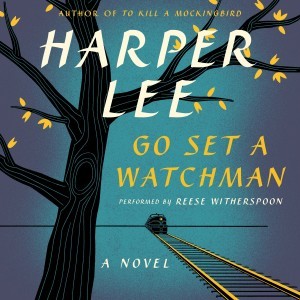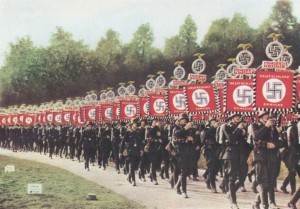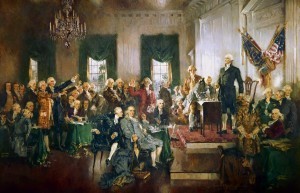David O. Stewart's Blog, page 5
January 11, 2016
Triumph of the Book!
The recent press accounts have been heartening to devotees of the book — which had been disdained as the “printed book” or “hard-copy book,” or even the “dead tree book.” It turns out that lots of readers prefer reading old-fashioned books to new-fangled e-readers.
That’s what college students say. They want to read a “real” book, not more content on a screen.
That’s what sales numbers say, with e-book sales flattening and even dropping off while printed books are doing all right.
Several studies have found that comprehension and retention of information are superior when reading books as opposed to e-books.
And now I can offer my own anecdotal data. On a relaxed holiday vacation with five other family members, four of whom are in their 30s, a range of interesting books appeared in many different hands, but nary an e-book appeared.
My own theory is that the reading public is already spending way too much time looking at screens for work or school. A book is quiet. It won’t beep at you, or “poke” you for a response, or drag your attention anywhere except the next sentence. Screens are for scanning; books are for reading.
This trend encourages me. It’s not that e-readers are dead, dying, or a terrible idea. Some people like them a lot. I’ve read books on a screen and it’s been okay. Nothing wrong with it. It’s just that I like reading actual books better. And it turns out there are a lot who agree with that conclusion.
Left on their own, sometimes humans figure things out, the Trump presidential candidacy to the contrary notwithstanding.
Even better news from the holiday trip: I read two great books.
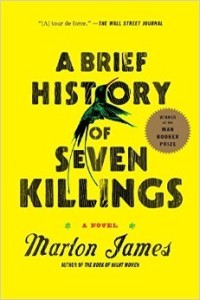 A Brief History of Seven Killings by Marlon Jones is a terrific novel, which you might expect of the winner of the prestigious Man Booker Prize. The novel is a demanding read, with a forest of Jamaican patois that requires considerable attention to figure out. And it’s long. But it explores Caribbean society in a powerful way, laying it bare. It also pulls no punches about American responsibility for Jamaican corruption and violence.
A Brief History of Seven Killings by Marlon Jones is a terrific novel, which you might expect of the winner of the prestigious Man Booker Prize. The novel is a demanding read, with a forest of Jamaican patois that requires considerable attention to figure out. And it’s long. But it explores Caribbean society in a powerful way, laying it bare. It also pulls no punches about American responsibility for Jamaican corruption and violence.
A much different book from a different era, The House of the Prophet by Louis Auchincloss, is equally outstanding. Auchincloss, a longtime partner at the stodgy New York law firm Sullivan & Cromwell, wrote about New York’s traditional upper class in the late nineteenth and twentieth centuries. He’s insightful and witty, and this book — supposedly based on the career of powerhouse columnist Walter Lippmann — is both engaging and a discerning examination of American society from World War I through the Vietnam War. Auchincloss had particular knowledge whereof he wrote, since he was literary executor for Lippmann. Check it out.
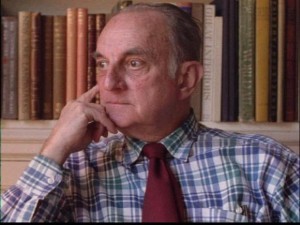
Louis Auchincloss
December 14, 2015
Eight Knockout Reads from 2015
Year’s end brings a geyser of lists of the year’s “best books.” I choose to modify this approach to report the best books that I read over the last year, since I get to few newly-issued books — pretty much only ones by friends or ones I’m writing a review of. Otherwise, I’m either reading something for my own research or trying to catch up on the best titles of the 1920s.
So, here goes with what some might call a thumpingly “guy” list:
Nonfiction
 A Wicked War: Polk, Clay, Lincoln, and the 1846 Invasion of Mexico, by Amy Greenberg — I know you haven’t been sitting up at night worrying about the Mexican War, but this treatment will keep you riveted with gripping portrayals of the fascinating characters at the center of this drama, America’s first official foray into imperialism. Greenberg finds America’s conduct disturbing, yet offers an unflinching view of our bold and highhanded seizure of Texas, Arizona, New Mexico, California, Nevada, and much of other Western states. To adapt the 1977 remark of Senator S.I. Hayakawa of California about the Panama Canal Zone, “We stole it fair and square.”
A Wicked War: Polk, Clay, Lincoln, and the 1846 Invasion of Mexico, by Amy Greenberg — I know you haven’t been sitting up at night worrying about the Mexican War, but this treatment will keep you riveted with gripping portrayals of the fascinating characters at the center of this drama, America’s first official foray into imperialism. Greenberg finds America’s conduct disturbing, yet offers an unflinching view of our bold and highhanded seizure of Texas, Arizona, New Mexico, California, Nevada, and much of other Western states. To adapt the 1977 remark of Senator S.I. Hayakawa of California about the Panama Canal Zone, “We stole it fair and square.”
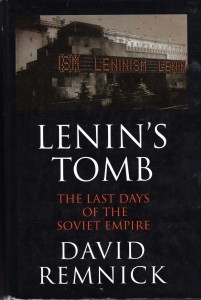 Lenin’s Tomb: The Last Days of the Soviet Empire, by David Remnick — As the Washington Post’s Moscow correspondent in the late 1980s and early 1990s — a job that that the Internet would soon eliminate by sucking the life out of modern newspapers — Remnick had a front-row seat on Mikhail Gorbachev’s desperate and doomed attempt to modernize the communist system. Remnick was indefatigable, talking to everyone he could find across the Soviet Union’s eleven time zones. He produced a compelling, appalling picture of a corrupt and greedy system that afflicted Russians for generations and richly deserved to die.
Lenin’s Tomb: The Last Days of the Soviet Empire, by David Remnick — As the Washington Post’s Moscow correspondent in the late 1980s and early 1990s — a job that that the Internet would soon eliminate by sucking the life out of modern newspapers — Remnick had a front-row seat on Mikhail Gorbachev’s desperate and doomed attempt to modernize the communist system. Remnick was indefatigable, talking to everyone he could find across the Soviet Union’s eleven time zones. He produced a compelling, appalling picture of a corrupt and greedy system that afflicted Russians for generations and richly deserved to die.
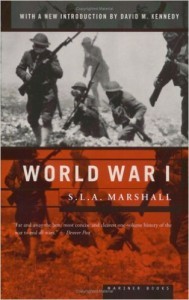 World War I, by S.L.A. Marshall — This fifty-year-old survey of the global catastrophe of The Great War is a wonderfully concise treatment (barely 500 pages) and a fitting way to honor the war’s centennial. An American Army general himself during World War II, Marshall doesn’t get bogged down in the military history (very little palaver about how the 257th Regiment angled slightly to the left of the 97th Grenadiers’ salient, which sat at right angles to the 1,576th’s order of attack). With insight and horror, he tells you what happened. Really good stuff that comes from the era before every nonfiction title required a colon and a subtitle.
World War I, by S.L.A. Marshall — This fifty-year-old survey of the global catastrophe of The Great War is a wonderfully concise treatment (barely 500 pages) and a fitting way to honor the war’s centennial. An American Army general himself during World War II, Marshall doesn’t get bogged down in the military history (very little palaver about how the 257th Regiment angled slightly to the left of the 97th Grenadiers’ salient, which sat at right angles to the 1,576th’s order of attack). With insight and horror, he tells you what happened. Really good stuff that comes from the era before every nonfiction title required a colon and a subtitle.
 The Fall of the Ottomans: The Great War in the Middle East, by Eugene Rogan — Yup, I burrowed pretty deep into World War I this year, and there’s that pesky colon + subtitle. But if you’re trying to figure out how the Middle East has turned into such a cradle of misery and slaughter, this is a good place to start. The Ottoman Empire, in truth, was the last caliphate. When it entered the war on the side of Germany and Austria-Hungary (remember Austria-Hungary?), the Ottoman emperor declared jihad against Britain and France, calling on all good Muslims to strike at the unbelievers. Familiar? On a note of personal privilege, it was also fascinating that the U.S. of A. actually sat this one out; we never declared war on the Ottomans. When was the last time we sat one out?
The Fall of the Ottomans: The Great War in the Middle East, by Eugene Rogan — Yup, I burrowed pretty deep into World War I this year, and there’s that pesky colon + subtitle. But if you’re trying to figure out how the Middle East has turned into such a cradle of misery and slaughter, this is a good place to start. The Ottoman Empire, in truth, was the last caliphate. When it entered the war on the side of Germany and Austria-Hungary (remember Austria-Hungary?), the Ottoman emperor declared jihad against Britain and France, calling on all good Muslims to strike at the unbelievers. Familiar? On a note of personal privilege, it was also fascinating that the U.S. of A. actually sat this one out; we never declared war on the Ottomans. When was the last time we sat one out?
Fiction
 Clockers, by Richard Price — This study of the war on drugs on the mean streets of North Jersey has been around since 1992, but it was new to me and it hasn’t aged a bit. Price’s cops are wrecks, running on fumes as they fight through the numbness induced by the sheer crumminess of the neighborhoods they’re trying to keep a lid on. The revelation in this book is the portrayal of the youthful drug dealers, who sink into their own numbness in a brutal world where every gesture, every facial expression may determine whether they live to the next minute. You know that blinding insight in Freakonomics that many drug dealers make so little money that they live with their moms? Price nailed that one in Clockers more than a decade before Freakonomics. This was a book I couldn’t put down. (Important tip: Spike Lee made a lousy movie from the book; avoid the movie.)
Clockers, by Richard Price — This study of the war on drugs on the mean streets of North Jersey has been around since 1992, but it was new to me and it hasn’t aged a bit. Price’s cops are wrecks, running on fumes as they fight through the numbness induced by the sheer crumminess of the neighborhoods they’re trying to keep a lid on. The revelation in this book is the portrayal of the youthful drug dealers, who sink into their own numbness in a brutal world where every gesture, every facial expression may determine whether they live to the next minute. You know that blinding insight in Freakonomics that many drug dealers make so little money that they live with their moms? Price nailed that one in Clockers more than a decade before Freakonomics. This was a book I couldn’t put down. (Important tip: Spike Lee made a lousy movie from the book; avoid the movie.)
 Elegy for April, by Benjamin Black/John Banville (read by Timothy Dalton) — The link here is to the audio book because I listened to this one, which proved to me that reader is far more than one of the James Bonds who didn’t really work out. This murder mystery, set in Dublin, isn’t about the puzzle or the thrills. The puzzle isn’t that puzzling and the thrills are thin on the ground. It’s about the gloomy, very strange characters (hint: the “hero” is named Quirke), the drizzly, chilly feel of Ireland, and mostly about gorgeous sentences. I may have enjoyed the language more because I listened to the book.
Elegy for April, by Benjamin Black/John Banville (read by Timothy Dalton) — The link here is to the audio book because I listened to this one, which proved to me that reader is far more than one of the James Bonds who didn’t really work out. This murder mystery, set in Dublin, isn’t about the puzzle or the thrills. The puzzle isn’t that puzzling and the thrills are thin on the ground. It’s about the gloomy, very strange characters (hint: the “hero” is named Quirke), the drizzly, chilly feel of Ireland, and mostly about gorgeous sentences. I may have enjoyed the language more because I listened to the book.
 All the Light We Cannot See, by Anthony Doerr — I didn’t want to read this one. Not more Nazis. But it’s such a smash (as I write, it’s still #21 on the Amazon bestseller list nearly two years after publication and has almost 20,000 reader reviews!). And, unexpectedly, it deserves all the acclaim. The writing is delicate yet powerful. Doerr’s central characters are a blind girl, her loving craftsman father, and a German orphan caught in the maw of the Nazi machine. Each is rendered in an achingly touching way. Even the Nazis are actual people, recognizable if hateful. It turns out there’s a reason everyone has been reading it. Read it.
All the Light We Cannot See, by Anthony Doerr — I didn’t want to read this one. Not more Nazis. But it’s such a smash (as I write, it’s still #21 on the Amazon bestseller list nearly two years after publication and has almost 20,000 reader reviews!). And, unexpectedly, it deserves all the acclaim. The writing is delicate yet powerful. Doerr’s central characters are a blind girl, her loving craftsman father, and a German orphan caught in the maw of the Nazi machine. Each is rendered in an achingly touching way. Even the Nazis are actual people, recognizable if hateful. It turns out there’s a reason everyone has been reading it. Read it.
Ashenden: The British Agent, by W. Somerset Maughan — Almost a century old, this progenitor of the modern spy story remains a terrific introduction to the clandestine world, based on Maugham’s own experience as a secret agent for British intelligence during World War I. I have written about the book elsewhere, applauding it’s exploration of the moral ambiguities of spy work and its understated yet excellent writing, based largely on piercing observations of people and life in general. (I acknowledge with slight despair that this book also was a pioneer in the use of the colon-beset title. Oh, well.)
September 2, 2015
Even Woodrow Wilson? The “Purge Moment” Runs Amok
Over the summer of 2015, the argument over displaying the Confederate flag in public grounds galvanized public opinion. Many conservative Southern Republicans agreed that such displays contradict our basic principles and publicly endorse bigotry. Even South Carolina, birthplace of secession, relented on the Confederate flag.
That argument swiftly metastasized into a full-throated uproar over public statues and place names that honor people whose earlier prejudices ill suit our self-image as nation that blends many peoples together. Even the New York Times, the official explainer of our lives, has christened this year a “purge moment,” one when Americans have begun to rummage through their psycho-historical closet and toss out their emotional bell-bottom trousers and other squirmy artifacts of earlier eras.
Among the historical figures being frog-marched to the cultural guillotine are:
Nathan Bedford Forrest: A feared Confederate cavalry commander, this Tennessean grew rich as a slave broker before the Civil War, became notorious when his troops massacred surrendering black Union Army soldiers at Fort Pillow, and went on to found the Ku Klux Klan. A trifecta of evil.
William L. Saunders: A Confederate Army officer and later KKK official who served as North Carolina’s Secretary of State.
Jefferson Davis: The only president of the secessionist Confederate States of America, though he also was a West Point graduate who served in the U.S. Army, as a United States Senator, and as Secretary of War.

Confederate President Jefferson Davis
Tearing these men’s names off buildings and mothballing their statues doesn’t faze me. People who rebel against the government and lose shouldn’t expect a lot of official tributes from that government. Only the regional quality of our Civil War allowed these Confederates to get statues and public buildings named after them in the first place.
Moreover, public obloquy is the fate not only of losers, but also of those viewed as oppressors or as holding odious views. One of the first acts of America’s revolutionaries – in July 1776 – was to tear down the statue of King George III in New York City.
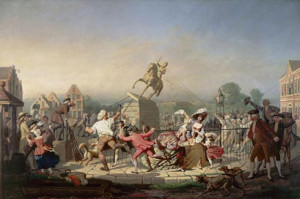
Pulling down King George III
Recall the glee with which many Americans watched the toppling of statues of Lenin and Stalin when the Soviet Union imploded in 1989, or the removal of Saddam Hussein statues in Iraq in 2003.
But this movement seems to be gaining steam, notably with President Obama’s decision to strike President William McKinley’s name from the tallest mountain in North America and restore the Indian name, . The decision had little to do with any sin of McKinley’s; rather, it was motivated by the wish to recognize Native American heritage. OK, pretty tough on McKinley, but at least no one’s calling him a monster.
Then this movement – – expanded to the demand to strip President Woodrow Wilson’s name off schools and other buildings on the ground that he was a bigot and racist. Whoa. Now this feels like we’re running off the rails.
My initial reaction was admittedly self-interested. I have a novel coming out in late September titled The Wilson Deception (available for pre-orders now!), which set at the Paris Peace Conference of 1919. The 28th president is a major character in the story. It seems unpropitious, at best, to launch the book at a time when Wilson’s name is under assault around the country. But there’s more to think about here.
A Man of his Time, Unfortunately
Wilson was a man of the South and and of his time, which meant he held substantial race prejudice. In fact, it’s featured in The Wilson Deception. As a historian, Wilson insisted that Southern slaves before the Civil War were largely well cared for and happy. As president, Wilson took steps to segregate the federal work force and reduce the number of African-American public employees. All hateful.
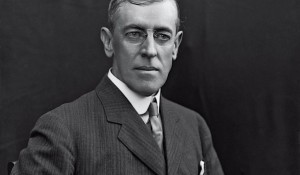
Woodrow Wilson, 28th President of the United States
But as president he also initiated remarkable achievements. His first term in office brought the Federal Reserve banking system, the Federal Trade Commission, and tougher antitrust laws. Although he opposed entering into World War I, he reversed himself after Germany’s declaration of unrestricted submarine warfare and its benighted attempt to stir a Mexican invasion of the United States.
When the Allies’ battlefield success forced Germany to sign an Armistice — yes, he won the war — Wilson inspired the entire world with his idealistic appeals to self-determination of peoples and his “Fourteen Points” for a peaceful postwar world. All of Wilson’s grandiosity and piety crashed around his ears when the United States refused to sign the gravely flawed Treaty of Versailles or to join his favored notion of an international League of Nations. But Wilson’s rhetoric and idealism still frame much international relations a century later.
Did Wilson bequeath a mixed public legacy? You bet. He was in many ways a tragic figure. In others, a limited one. But it’s a dramatic over-reaction to start scrubbing his name off public buildings. We’ve had more than a few national leaders with less-than-enlightened views about race, though those views were entirely consistent with those of their contemporaries.
Let He Who Is Without Sin . . .
George Washington, after all, was a major slaveholder who insisted that his slave work force had to be disciplined, which meant the whip. Should we take his name off Washington, DC? How about the state of Washington?
Thomas Jefferson. James Madison. James Monroe. Andrew Jackson. Slaveholders every one. At least Jefferson and Madison felt guilty about it, but that didn’t do much for their slaves. None lifted a finger to change slaveholding in America. Shall we change the names of three state capitals (Jackson MI, Madison WI, Jefferson City MO), plus the twenty-eight towns and eighteen counties named for Monroe?
No, I don’t think so, either. Not all of history is glorious, not even all of our history. Attitudes change, sometimes for the better. Those who rebelled and lost, those who espoused hate without any other worthy achievements — fine, a la guillotine! But let’s use some judgment, draw some distinctions.
Then along comes the University of Texas. They have just removed statues of Jefferson Davis and — oh, no! — Woodrow Wilson. I am flummoxed. Wilson was the president of the UNITED STATES; Davis was president of the CONFEDERATE STATES. Can’t they tell the difference? Is it that they’ve been reading those twisted history textbooks they use down there? It’s time to sit down a breathe deeply.
Which leads to another question: Where should we put those statues of the disfavored?
On this question, I can help. We should put all the verboten statues in a Theme Park of the Evil Ones and charge admission. Don’t laugh. In 2008, I went to just such a place on the outskirts of Budapest, Hungary, where they have stashed all the Lenin, Stalin, and brawny-socialist-worker statues of the Communist era. It was great! Add some deep-fried Twinkies and you’ve got some serious economic development.
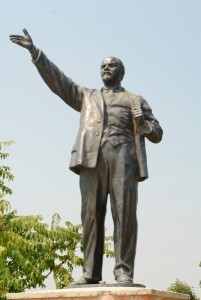
Brother Lenin, exiled to suburban Budapest but bringing in entrance fees!
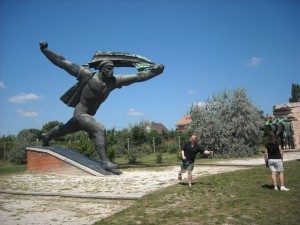
My son Matt offers his interpretation of a massive Socialist statue mothballed outside Budapest
August 7, 2015
Harper Lee, Misogynist
After all the fuss about the release of Harper Lee’s second/first novel, Go Set A Watchman, I broke down and read it. My wife, after all, had purchased the book, so I was just maximizing the value of the family purchase.
As I neared the novel’s end, my thoughts were in line with a number of the reviews I had read — not a great novel, but well-meaning. It’s slow getting started, earnest in its intentions, weak on plot, contains some flashes of very fine observation of Southern society, and tussles with the central issue of the late 1950s in the South: how to respond to the Supreme Court’s ruling in Brown v. Board of Education that public schools in America could not be racially segregated.
The heroine, Jean Louise Finch, has returned from New York and discovered to her horror that her sainted father (Atticus Finch, a/k/a Gregory Peck of the movie To Kill A Mockingbird, Lee’s other book) is playing footsie with the bigots and nigger-haters in town over ways to slow down the racial integration that white Southerners are not ready for.
So Jean Louise (finally) begins to confront her father, her fiancee (sadly, not quite up to her social status), and her elliptical uncle over this essential challenge when Uncle Jack manages to make her see reason, courtesy of a couple of quick shots to the jaw.
That’s right. Uncle Jack causes Jean Louise to understand the Southern white position by slugging her in the face. Not once (a “savage backhand swipe”), but twice (her head “met his hand coming viciously back”). He is merely, Uncle Jack explains, “trying to attract your attention.”
After that appeal to sweet reason, Jean Louise has an epiphany, seeing the wisdom of the go-slow crowd led by her father. Those punches to the head also help her confront her lifelong hero-worship of Daddy, and reconciles her to a life spent cozying up to the troglodytes of the fictional town of Maycomb, Alabama, to help them get used to the outlandish idea that black people might actually be people and not some intermediate form of species between apes and humans.
Really? Am I the only one who — putting racial politics aside, if that’s possible when dealing with Lee’s books — who cringed at the suggestion that beating up a woman was the way to get your point across? I have read a least a dozen articles and reviews about the book and still was entirely unprepared for this hateful plot device.
I made two quick associations between Watchman‘s embrace of violence against women and other contemporaneous examples. The wonderful movie Anatomy of a Murder (1959) focuses on the marriage between a flirtatious woman (Lee Remick) and a jealous soldier (Ben Gazzara). When the husband has to answer for slugging his wife after she was raped by another man, he explains that she was “hysterical,” and he was simply helping her calm down. His wife then has to parrot the same contemptible explanation. Really? That’s okay?
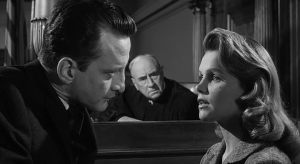
Lee Remick faces the withering cross-examination of George C. Scott in “Anatomy of a Murder”
And then there is Lee’s legendary Mockingbird novel, which pivots on the rape trial of a one-armed black man, Tom Robinson, accused of attacking a white-trash woman. As Malcolm Gladwell laid out cogently a few years ago, Atticus Finch’s supposedly heroic courtroom defense of Robinson (white Southern lawyers simply didn’t do such things) involved principally blaming the rape victim for enticing Robinson and luring him on. In other words, the black man’s rights were to be upheld by stomping on the woman’s. Not an unusual rape defense, of course, but one with significant misogynistic elements.
Watchman‘s bizarre and off-handed reliance on physical abuse of a woman to bring its plot to a close seems to be an artifact of a time when the social consensus against such violence was weak, at best. Lord, I hope that has changed, but I still am bothered by the question I raised before: Hasn’t anyone else noticed? Shouldn’t the “watchman” in Lee’s book, and in our lives, be watching out for beating up women, too?
July 31, 2015
The Enduring Lure of Richard Nixon
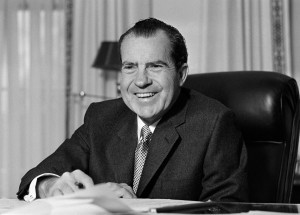
Nixon on his second day as president, Jan. 21, 1969.
Coming up to the 41st anniversary of Richard Nixon’s resignation from the Presidency (August 9), we find that he’s still part of our national culture, like a barnacle that simply won’t be scraped off.
He was the heavy in the the first presidential election I remember — the jowly, borderline-scary guy who opposed the cool, collected, in-command John Kennedy. To a nine-year-old, the choice was clear. Who could trust this figure composed of so many dark elements?
When he won a presidential election eight years later during the Vietnam War, he did it with skulduggery that bordered on treason: his intermediaries passed the word to South Vietnam’s leadership that they shouldn’t cooperate in peace talks because a Nixon Administration would insist on a more favorable settlement. The South Vietnamese dutifully boycotted any talks and Nixon won the campaign on a pledge to find peace with honor, which was exactly what he had just prevented President Lyndon Johnson from doing.
As president, his performance was so maddeningly mixed. He presided over tragic continuing American involvement in the Vietnam War for four more years, another 20,000 American deaths and many more injuries, securing a peace with no honor that led inevitably to the collapse of South Vietnam. His policies on Vietnam were cravenly designed to serve his own political needs with little regard to the devastation inflicted on Vietnamese and American lives.
Yet his diplomatic outreach to China was farsighted and important, while his domestic policies included the enactment of groundbreaking environmental-protection laws: the National Envrionmental Policy Act (NEPA), the Clean Air Act Extension of 1970, the Safe Drinking Water Act, and the Endangered Species Act. His civil-rights enforcement record was respectable.
And then, of course, there was Watergate, the intertwined patterns of government overreach that mingled viciousness with small-mindedness in a way that never fails to appall and ultimately caused a large majority of the nation to turn away from its president in disgust. With impeachment looming, he became the only president to resign from office.
I think it’s the contradictions that have made Nixon such an enduringly fascinating character.

Nixon never got off the third-string for the Whittier College football team, but kept trying.
I got a renewed whiff of this a couple of years back at the Nixon Presidential Library’s exhibits, which were then a weirdly bungled yet compelling attempt to tell his story. Until his mid-twenties, Nixon seemed an impressive young man. His family — serious Quakers in Southern California’s Eden, a contradiction right there — struggled financially. Two of his brothers died of illness. His boyhood house was humble. Yet Nixon was fired with ambition. He was smart and academically successful, learned five musical instruments, and fell in love with a smart young woman who landed bit parts with the movies.
But there seems always to have been a dark side, growing from that ambition. He rose like a rocket in Republican politics. By age 39, he had won a spot on Dwight Eisenhower’s 1952 presidential ticket. But Ike didn’t seem to care much for or about his bright young running mate. After eight years in the wilderness of the vice presidency came the flameout of the 1960 presidential election, then losing the California governor’s race in 1962.
And then the comeback of 1968 and the final flameout from Watergate. Except Richard Nixon never accepted oblivion, not even then. He wrote books and spoke to world leaders and slowly, painstakingly tried to rehabilitate his image.
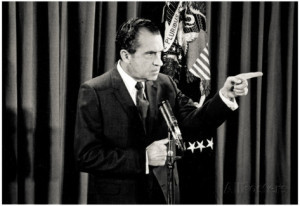
Sometimes, the darkness inside Nixon just came out.
Now he’s the plaything of artists and composers. In March, the San Diego Opera staged Nixon in China,the John Adams opera about his China initiative. In movies, there are All the President’s Men, which is really about the hunt for Nixon over Watergate, and Oliver Stone’s Nixon, in which even the brilliant Anthony Hopkins couldn’t capture Nixon’s complexity. Thomas Mallon’s recent novel Watergate is a brilliant contemplation and interpretation of Nixon, his people, and his time. The recently-released novel Crooked purports to take a supernatural riff on Nixon’s dark side.
And, of course, the historians and biographers have been beavering away, trying to make sense of this melange of a man, his achievements and catastrophes. One of the great moments in Nixon obsession arose last Sunday when Carl Bernstein — half of the Woodward/Bernstein team at the Washington Post that pursued the Watergate story so brilliantly — reviewed two current Nixon books (in the Washington Post, natch).
Bernstein used the occasion for a brilliant application of the Goldilocks paradigm — you remember, not-too-hot, not-too cold? He ripped Evan Thomas’ Being Nixon: One Man Divided for being too kind to Nixon; sure, the humanizing moments noted by Thomas were true, Bernstein admits, but Thomas let the man off the hook too much. And what about Tim Weiner’s One Man Against the World: The Tragedy of Richard Nixon? Far too tough for Bernstein’s taste, falling too often into “gratuitous attribution of base motive to almost everything Nixon did.”
It may be too much to expect Bernstein to applaud anyone’s version of Nixon other than his own. Personally, I’m looking forward to the Nixon bio being written now by Jack Farrell. Bernstein probably won’t like it, but what does he know? Nixon belongs to all of us.
More’s the pity.
July 14, 2015
Nazi Fatigue
I need a break from Nazis, Nazism, SS officers, concentration camps, swastikas, and the crazy guy with the toothbrush mustache. Yeah, this guy.
They’re all powerful symbols, with deep back-story and instant cultural connections that are so useful to writers and movie directors. And, to be fair, the Nazi era represents a moment in human history when the most educated society on the planet managed to come very close to collective insanity. Pretty interesting.
But I can’t take any more right now. A lot of this is self-inflicted. I visited Berlin in late May and took a cold but fascinating bath in 20th-century German history. I just finished reading All the Light We Cannot See by Anthony Doerr, which is a terrific book . . . about Nazis. And March Violets, by Philip Kerr, which is a good detective book . . . about Nazis.
Then there are all of Alan Furst’s books, which explore from different European perspectives the brutal tensions of the rising Nazi movement. They’re great. I eat them like candy. Not to overlook William Styron’s great Sophie’s Choice, or Vassily Grossman’s Life and Fate, the best novel I’ve read in decades. Maybe ever.
The nonfiction side is available too. Erik Larson’s recent hit In the Garden of Beasts, . . . you know who the beasts are without cracking the cover. Looking for almost a thousand pages on Hitler henchman and evil PR genius Joseph Goebbels? Peter Longerich’s biography is just out and made for you!
Let’s not overlook the movie industry, which knows how to capitalize on jackbooted villains whose entire identity is disclosed from a glancing view of a Hitler salute, swastika, or black uniform. Just sticking to a few high points, there’s
“Downfall” (Hitler’s final, hysteria-filled days in the bunker)
“Schindler’s List” (Spielberg finds a good German)
“Cabaret” (Liza Minelli sings while Hitler burns)
“Judgment at Nuremburg” (Spencer Tracy administers American justice to Nazi baddies, while acknowledging that a culture that produced Marlene Dietrich should not be written off forever)
“Casablanca” (Bogie gives the Krauts what-for)
Even, for-heaven’s-sake, Indiana Jones, over and over and over (as in the Lost Crusade, below).
 So I’m going to try to go cold turkey. I think of it as cleansing the moral palate. No Nazis for a while. Or, I suppose, until I hear about something really good.
So I’m going to try to go cold turkey. I think of it as cleansing the moral palate. No Nazis for a while. Or, I suppose, until I hear about something really good.
July 6, 2015
Madison on TV: August 1814
I’ve been pleasantly surprised by the slick trailer just posted for a new TV documentary on Madison’s flight from Washington in August 1814, one jump ahead of British troops victorious from the Battle of Bladensburg. After fleeing across the Potomac and spending the night in Virginia, Madison made his way to Brookeville, Maryland to try to reassemble the shattered American government after the British had burned Washington’s public buildings, including the White House (above).
The documentary, directed by Mark Hildebrand, is titled Brookeville: Capital for a Day, and tells the story of this true crisis during the War of 1812. Though Madison was by no means a great war leader, his calm leadership ultimately brought the nation through a terrible testing. Check out the trailer and if you receive Maryland Public Television, mark your calendars for August 26. The hourlong film will air that evening at 10 p.m.
Oh, yeah. I’m one of the onscreen commentators for the film. But you probably suspected that.
May 10, 2015
What’s so bad about saying you were wrong?
I recently became fed up with the media reports about the presidential candidates and their “flip-flopping” on various issues. For the rest of us, changing our mind is often described as learning, or even considering a matter more deeply.
For politicians, we have made it a sign of weakness, weak-mindedness, or craven pursuit of political advantage. Don’t get me wrong. Sometimes a politician’s change of position is due to those considerations. But let’s talk about what the positions are, not the “gotcha” politics of hunting down inconsistent statements. Was Lincoln a less credible advocate of emancipation because he previously didn’t support it?
Please check out my further thoughts here. And here’s a selection of our presidential flip-floppers.

First president George Washington, flip-flopper on military strategy against the British.

James Madison, fourth president, flip-flopper on the Bank of the United States, and other issues.
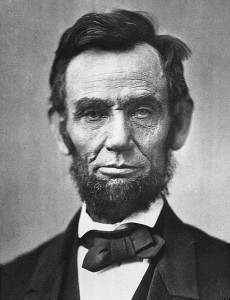
Abraham Lincoln, sixteenth president, Flip-flopper on emancipating slaves.
March 26, 2015
Danger: Constitutional Convention Ahead?
I’ve got a piece today in the Baltimore Sun, warning of the dangers of a second constitutional convention, which a shocking number of state legislatures are proposing willy-nilly. They need to stop and think.
James Madison fought every proposal for a second constitutional convention, warning that it could be the scene of all manner of mischief. He knew whereof he spoke, since he and others diverted the first Constitutional Convention from its professed purpose of rewriting the Articles of Confederation and converted it into the vehicle for creating a completely new government.
March 21, 2015
Books and (Semi) Mass Media
Having published my book on James Madison last month (Madison’s Gift), I share one trait with most authors of a recently-released book: A wistful desire that great chunks of the reading public will exercise their right to pay a modest sum to own my book.
This desire to sell books makes authors willing to undergo many forms of humiliation. One is the media interview. We do them in order to build the buzz around books on which we have just lavished a significant chunk of our time on earth.
First, my statement of principle. I am entirely thrilled that there are gatekeepers to the American audience who are willing to allow me to yammer about James Madison from their hard-won public platforms. Climbing onto those platforms, however, can involve risk.
Different hosts, for example, engage in different levels of preparation. I offer a quick taxonomy:
Ferociously well-prepared: Brian Lamb on C-SPAN is the leading example of this method. An interview on his Q&A program resembles a game of intellectual whack-a-mole. His questions leap from topic to topic while he fondles your book, which he has festooned with yellow stickies and marginal notes. Do not take Mr. Lamb for granted.
The staff read the book: I don’t mean this snidely. A smart host can get a good list of questions from an underpaid but diligent staff member, riffle through the book, and conduct a very fine interview. Hey, I’m a professional, too. Just mention the topic and I’ll come up with something to say. I’ll even compliment your question. Had a great radio interview with Jim Engster in Louisiana. I’ll bet dollars to doughnuts he didn’t read the book.
“I took the book home last night”: This chilling statement by your host omits any claim that the book was opened. Because I (mostly) write history, this usually presages a series of questions based on half-remembered high-school classes, refracted by political views acquired since. The author should fasten his/her seatbelt; this may be a bumpy ride.
Stuart Varney of Varney & Company: I’ll admit it. I had never heard of the guy or his show on Fox Business Channel, but I was tickled to be invited for a Presidents’ Day appearance. While I waited in a remote studio in Florida to be patched in for some quality on-air Madison time, I watched the first 40 minutes of the show. Varney & Company’s principal theme, delivered in Mr. Varney’s smooth British accent, was that Barack Obama is responsible for everything that is wrong in this galaxy, and probably all the other galaxies, too. No big deal, I figure. We’ll talk about Madison, right? I herewith offer a reconstructed version of my 45 seconds on the show:
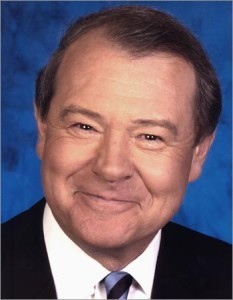
Stuart Varney: What, me worry?
Host: Welcomes me, the author of Madison’s Myth [urgent: Do I correct him, since the book is Madison’s Gift? Oops, too late, he’s on his first question]: So, as a historian, thirty years from now, what will historians make of Barack Obama?
Me: [It’s about Madison, dude! I wrote about Madison!] Ah, um, he’s had many challenges to deal with, two wars and a financial collapse, but the health insurance legislation will be noted as a major initiative, though that may be a controversial view on this show.
[Big mistake: Should have ignored the question and talked about Madison. Worse, I left the door open for the host to talk about himself and his show. He does. Then notices I’m still on his screen.]
Host: So, Mr. Stewart, tell us about Jefferson.
Me: [Can’t you tell Jefferson apart from Madison, you empty-headed limey piece of . . .?] I speed through a 15-second summary of the book, mentioning Madison’s name several times. Madison. Madison. Madison. Breathe. Wait for follow-up question.
Commercial Break! Thanks for playing.
I stumble out of the studio into a lovely Florida day. The black sedan is still waiting to take me back to the hotel.
Building the buzz. It’s what I do.



